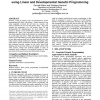Free Online Productivity Tools
i2Speak
i2Symbol
i2OCR
iTex2Img
iWeb2Print
iWeb2Shot
i2Type
iPdf2Split
iPdf2Merge
i2Bopomofo
i2Arabic
i2Style
i2Image
i2PDF
iLatex2Rtf
Sci2ools
124
click to vote
GECCO
2009
Springer
2009
Springer
Soft memory for stock market analysis using linear and developmental genetic programming
Recently, a form of memory usage was introduced for genetic programming (GP) called “soft memory.” Rather than have a new value completely overwrite the old value in a register, soft memory combines the new and old register values. This work examines the performance of a soft memory linear GP and developmental GP implementation for stock trading. Soft memory is known to more slowly adapt solutions compared to traditional GP. Thus, it was expected to perform well on stock data which typically exhibit local turbulence in combination with an overall longer term trend. While soft memory and standard memory were both found to provide similar impressive accuracy in buys that produced profit and sells that prevented losses, the softer memory settings traded more actively. The trading of the softer memory systems produced less substantial cumulative gains than traditional memory settings for the stocks tested with climbing share price trends. However, the trading activity of the softer me...
| Added | 26 May 2010 |
| Updated | 26 May 2010 |
| Type | Conference |
| Year | 2009 |
| Where | GECCO |
| Authors | Garnett Carl Wilson, Wolfgang Banzhaf |
Comments (0)

